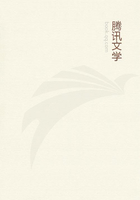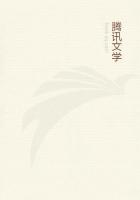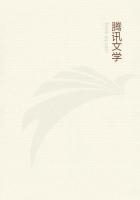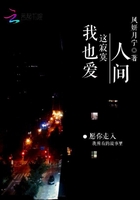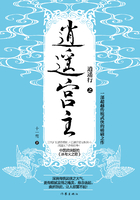Before the bishop in his gilded cope or before the monk, the converted German "emaciated, clad in skins," wan, "dirtier and more spotted than a chameleon,"[1] stood fear-stricken as before a sorcerer. In his calm moments, after the chase or inebriety, the vague divination of a mysterious and grandiose future, the dim conception of an unknown tribunal, the rudiment of conscience which he already had in his forests beyond the Rhine, arouses in him through sudden alarms half-formed, menacing visions. At the moment of violating a sanctuary he asks himself whether he may not fall on its threshold with vertigo and a broken neck.[2] Convicted through his own perplexity, he stops and spares the farm, the village, and the town, which live under the priest's protection. If the animal impulse of rage, or of primitive lusts, leads him to murder or to rob, later, after satiety, in times of sickness or of misfortune, taking the advice of his concubine or of his wife, he repents and makes restitution twofold, tenfold, a hundredfold, unstinted in his gifts and immunities.[3] Thus, over the whole territory the clergy maintain and enlarge their asylums for the oppressed and the vanquished. - On the other hand, among the warrior chiefs with long hair, by the side of kings clad in furs, the mitered bishop and abbot, with shaven brows, take seats in the assemblies;they alone know how to use the pen and how to discuss. Secretaries, councilors, theologians, they participate in all edicts; they have their hand in the government; they strive through its agency to bring a little order out of immense disorder; to render the law more rational and more humane, to re-establish or preserve piety, instruction, justice, property, and especially marriage. To their ascendancy is certainly due the police system, such as it was, intermittent and incomplete, which prevented Europe from falling into a Mongolian anarchy. If, down to the end of the twelfth century, the clergy bears heavily on the princes, it is especially to repress in them and beneath them the brutal appetites, the rebellions of flesh and blood, the outbursts and relapses of irresistible ferocity which are undermining the social fabric. - Meanwhile, in its churches and in its convents, it preserves the ancient acquisitions of humanity, the Latin tongue, Christian literature and theology, a portion of pagan literature and science, architecture, sculpture, painting, the arts and industries which aid worship. It also preserved the more valuable industries, which provide man with bread, clothing, and shelter, and especially the greatest of all human acquisitions, and the most opposed to the vagabond humor of the idle and plundering barbarian, the habit and taste for labor. In the districts depopulated through Roman exactions, through the revolt of the Bagaudes, through the invasion of the Germans, and the raids of brigands, the Benedictine monk built his cabin of boughs amid briers and brambles.[4] Large areas around him, formerly cultivated, are nothing but abandoned thickets. Along with his associates he clears the ground and erects buildings; he domesticates half-tamed animals, he establishes a farm, a mill, a forge, an oven, and shops for shoes and clothing. According to the rules of his order, he reads daily for two hours. He gives seven hours to manual labor, and he neither eats nor drinks more than is absolutely essential. Through his intelligent, voluntary labor, conscientiously performed and with a view to the future, he produces more than the layman does. Through his temperate, judicious, economical system he consumes less than the layman does.
Hence it is that where the layman had failed he sustains himself and even prospers.[5] He welcomes the unfortunate, feeds them, sets them to work, and unites them in matrimony and beggars, vagabonds, and fugitive peasants gather around the sanctuary. Their camp gradually becomes a village and next a small town; man plows as soon as he can be sure of his crops, and becomes the father of a family as soon as he considers himself able to provide for his offspring. In this way new centers of agriculture and industry are formed, which likewise become new centers of population.[6]
To food for the body add food for the soul, not less essential.
For, along with nourishment, it was still necessary to furnish Man with inducements to live, or, at the very least, with the resignation that makes life endurable, and also with the poetic daydreams taking the place of massing happiness.[7] Down to the middle of the thirteenth century the clergy stands almost alone in furnishing this.
Through its innumerable legends of saints, through its cathedrals and their construction, through its statues and their expression, through its services and their still transparent meaning, it rendered visible "the kingdom of God." It finally sets up an ideal world at the end of the present one, like a magnificent golden pavilion at the end of a miry morass.[8] The saddened heart, athirst for tenderness and serenity, takes refuge in this divine and gentle world. Persecutors there, about to strike, are arrested by an invisible hand; wild beasts become docile; the stags of the forest come of their own accord every morning to draw the chariots of the saints; the country blooms for them like a new Paradise; they die only when it pleases them.

